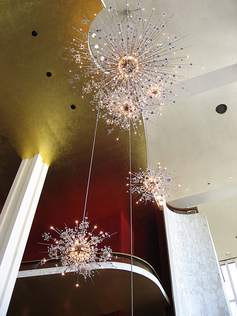
In a college auditorium in Buffalo, the scene is set for the district finals of the annual Metropolitan Opera National Council Auditions. Three distinguished judges and nearly 50 young singers are ready to get started. A clutch of hard-core opera fans sits in the audience; a well-worn baby grand piano sits on the stage. Off to one side stands the American flag.
But the flag might as well be that red-and-white one with the maple leaf: Most of the contestants here are Canadians. From British Columbia to Nova Scotia, they came to Buffalo last Saturday for a shot at the big time. Although a third to a half of contestants always come from Canada, says Dianne Rubin, one of the volunteer organizers, “This year, we have a larger percentage of Canadians than usual.”
And the winners of that competition? They go on to operatic fame and fortune. Or at least that’s the idea. Although some have sunk into obscurity, the competition has launched many careers. Among past Canadian winners: Teresa Stratas, Maria Pellegrini, Ben Heppner and Isabel Bayrakdarian.
Last year, Ottawa bass-baritone Philippe Sly, 22, went all the way to victory in New York. He’s now in the Canadian Opera Company’s Ensemble Studio program. His advice to this year’s crop: “Don’t just learn something extravagant for the competition. Sing what you can sing well, and the judges will recognize that. The judges want you to do well – they hope you’re the next big thing.”
Of the 47 entrants who competed in Buffalo, only four would advance to the regional competition, in Pittsburgh, on Sunday. The national competition takes place at the Metropolitan Opera on March 18, 2012.
The singers in Buffalo were all in their 20s: fresh-faced, well-dressed, well-prepared and very talented. This isn’t some American Idol-style event, where mostly ordinary people are thrust onstage to sink or swim. These singers are pursuing advanced opera studies – in a university, conservatory or perhaps a training program run by an opera company – or they’ve just finished school and are looking to launch their careers.
While the singers all have their strengths, a contest like this can also throw harsh light on weaknesses. The judges’ task is to home in on those ready to step onto the professional opera stage.
At the end of the afternoon, they announce their four selections. Two are Canadian. Both – soprano Karine Boucher and tenor Riccardo Iannello – are currently in the Montreal Opera’s Ensemble Lyric training program.
“This was my first time doing the Met competition,” says Iannello, 29, who is from Toronto. “I thought: Why not give it a chance?”
Iannello isn’t from a musical family – but he grew up speaking Italian at home, and his fluency no doubt helped with his strong showing as he performed Quando le sere al placido from Verdi’s Luisa Miller. Perhaps that’s why, for his second aria, the judges challenged him by requesting the only Russian-language aria on his list of five operatic excerpts, from Tchaikovsky’s Eugene Onegin.
“I’m excited and nervous about Pittsburgh,” says Iannello. “I came here to Buffalo not really expecting anything, so it’s a nice surprise to win. But I’m ready to take the next step.”
As for those who won’t be doing that, there’s always next year. There’s also the consolation that there are other paths to becoming an opera singer: Many of the best never won a competition. Still, a victory at the Met is a launching pad like no other.
Honourable Mentions
Three Canadians failed to proceed to the next stage of the Metropolitan Opera National Council Auditions, but each showed genuine promise.
Soprano Andrea Nunez, of Markham, Ont., won an “encouragement award” for her vocally agile Salut à la France from Donizetti’s La Fille du Régiment. She’s only 21, so has plenty of time to develop and advance.
Surprisingly, there was no prize for Toronto mezzo-soprano Marta Herman, who sang Non, vous n’avez jamais from Meyerbeer’s Les Huguenots. At 24, she has a warm maturity to her voice that can only help her career.
Even more surprisingly, the judges overlooked soprano Suzanne Rigden, 26, of Dartmouth, N.S. She nailed Der Holle Rache, the stratospheric aria for the Queen the Night from Mozart’s Magic Flute.
© Colin Eatock 2011
 RSS Feed
RSS Feed

